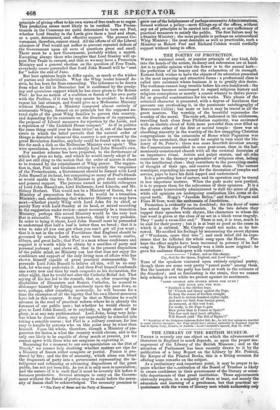THE POETRY OF PROTECTION.
WHEN a national creed, or popular principle of any kind, falls
into the hands of the artists, its decay and subversion are at hand. Art is to public opinion what the flower is to the annual herb— the perfection of its beauty and the exhaustion of its strength. Earnest faith wishes to have the objects of its adoration presented in the most imposing and attractive forms : a professional class is called into existence whose business it is to gratify this desire. The workman cannot long tremble before his own handiwork: the artist soon becomes accustomed to regard religious history and religious conceptions as merely a source whence to derive power- ful or graceful combinations for his works. This phasis of the artistical character is presented, with a degree of harshness that prevents our overlooking it, in the passionate autobiography of Benvenuto Cellini ; but more or less it may be traced in all the great masters. The worship of the beautiful supersedes the worship of the moral. The rude ark, fashioned in the wilderness, travelling back alone from Philistian captivity, was environed with an electric cloud of faith more powerful than ever filled up the glories either of the first or second temple : there was an absorbing sincerity in the worship of the few straggling Christian congregations in the catacombs of Rome while Paganism was yet in the ascendant, that would be sought in vain amid the bla- zonry of St. Peter's : there was more heartfelt devotion among the Cameronians assembled in some peat-moss, than in the har- moniously-constructed church with all the external decorums of an impressive ritual. Artists and pulpit orators, and all-who contribute to the decency or splendour of religious rites, belong to the intellectual class : they contribute to the prevailing modes of thought of their age, and receive from them. The earnest worshiper, expending his money for the decoration of temples and service, pays to have his faith sapped and undermined.
It is a pervading law of nature, and its operation may be traced
in less important matters. When the gods make men poetical, it is to prepare them for the subversion of their opinions. It is a moral opiate benevolently administered to dull the sense of pain, while old opinions are undergoing eradication like corns or de- cayed teeth. Hogg's "Jacobite Relics," and Scott's Fergus and Flora. M'Iver, were the euthanasia of Jacobitism.
Protection is evidently on its deathbed ; for the fever of verse has seized upon the Protectionists. In the late debate they tagged their speeches with rhyme, like characters to whom the last word is given at the close of an act in a blank verse tragedy. They "make a swan-like end." There is not, it is true, much to be said for their poetry ; but it is at least as good as the cause in which it is enlisted. Mr. Cayley- could not make, so he bor- rowed. He soothed his feelings by murmuring the sweet rhymes of "Woodman, spare that tree"; and such reliefdid he expe- rience that he inflicted the whole song upon the House. Per- haps the effect might have been increased in potency if he had sung it. The Marquis of Granby was a little more original: he gave his audience Shakspere with variations : " Follow and on this charge, Cry, God for the Queen, ingland, and Lord George!"
None of the speakers ventured upon entirely original poetry, though there are some very pretty 'parcel poets" among them. But the laureate of the party has been at work in the columns of the Standard; and so fascinating is the strain, that we cannot help echoing it even while we protest against its sentiments.
"LORD GEORGE AND STABLE MINDS FOR EVER! THE HOUR AND THE MAN.
" Bentinck is the chiefest hope, Of Church and Queen' against the Pope, To keep the course of from straight, As fixed in sixteen-hundred-eighty-eight. And save our faith from foreign power, As menaced, at this very hour. For really, is the Pope to gain More power than in France or Spain?* This tear each loyal heart affrights, Will Russell yield The Bill of Rights'?"
• " Speaking of the Religious Opinions Relief Bill, &c., he felt that unless we resorted to some ulterior measure, the Pope might have greater authority In England than he had in Spain, Italy, France, or Austria.—Lord Campbell's Speech, May 11, 1846."


























 Previous page
Previous page